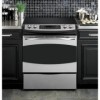GE PS968SPSS Use and Care Manual - Page 18
Consumer Support, Troubleshooting Tips, Care and Cleaning, Safety Instructions
 |
UPC - 084691197546
View all GE PS968SPSS manuals
Add to My Manuals
Save this manual to your list of manuals |
Page 18 highlights
Safety Instructions Operating Instructions Using the oven. Leave the door open to the broil stop position. The door stays open by itself, yet the proper temperature is maintained in the oven. How to Set the Oven for Broiling If your range is connected to 208 volts, rare steaks may be broiled by preheating the broiler and positioning the oven rack one position higher. Use LO Broil to cook foods such as poultry or thick cuts of meat thoroughly without overbrowning them. Place the meat or fish on a broiler grid in a broiler pan designed for broiling. Follow suggested rack positions in the Broiling Guide. Touch the BROIL HI/LO pad once for HI Broil. To change to LO Broil, touch the BROIL HI/LO pad again. Touch the START pad. When broiling is finished, touch the CLEAR/OFF pad. The size, weight, thickness, starting temperature and your preference of doneness will affect broiling times. This guide is based on meats at refrigerator temperature. † The U.S. Department of Agriculture says "Rare beef is popular, but you should know that cooking it to only 140°F means some food poisoning organisms may survive." (Source: Safe Food Book. Your Kitchen Guide. USDA Rev. June 1985.) Broiling Guide Preheat the broiler for 2 minutes to improve performance. Food Beef Chicken Doneness Rare (140°F) Medium (160°F) Well Done (170°F) Type or Thickness Rack Position* Comments Steaks - 1″ thick E or F (food should be 1″ to 3″ from broil element) Steaks - 3/4″ to 1″ thick E (food should be 3″ to 4″ from broil element) Steaks - D or E (food should be 3″ 3/4″ to 1″ thick to 5″ from broil element) or Ground Beef Patties Steaks less than 1″ thick are difficult to cook rare. They cook through before browning. To prevent curling of meat, slash fat at 1″ intervals. Breast, boneless C (food should be 8″ Broil skin-side-down to 9″ from broil element) first. Fish Fillets Pork Chops Well Done (170°F) Breast, bone-in 1/2″ to 1″ thick 3/4″ thick C (food should be 7″ to 8″ from broil element) D or E (food should be 3″ to 6″ from broil element) D (food should be 6″ to 7″ from broil element) *Use rack position A for the smaller, 2-rack-position oven. Handle and turn very carefully. To prevent curling of meat, slash fat at 1″ intervals. Consumer Support Troubleshooting Tips Care and Cleaning 18















